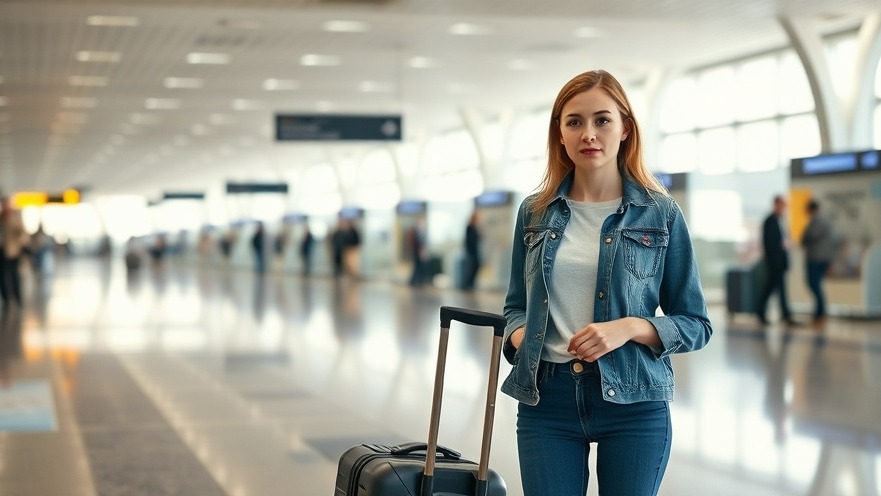
Understanding and Managing Travel Stress
The thrill of embarking on a journey to far-off places can quickly turn to anxiety. As travelers, we often face an array of stressors: tight schedules, unfamiliar environments, and fatigue. This can manifest as physical discomfort, such as headaches and nausea, or emotional turmoil, including irritability and heightened anxiety.
According to wellness coach Marina Chen, the complexities of travel often amplify stress. "Travel combines multiple stressors at once, which can be overwhelming. You’re dealing with time pressure, sleep disturbances, and sometimes poor nutrition all at once," she describes. This unique blend of stressors makes understanding methods to combat travel anxiety essential—not only for personal well-being but also for enhancing the overall travel experience.
Natural Remedies: A Solution to Travel Anxiety
While many people may reach for conventional medications, there is an increasing trend towards utilizing natural remedies to ease travel stress. From aromatherapy to adaptogenic herbs, these holistic options can promote relaxation and help maintain equilibrium on the road.
Portable Aromatherapy: Essential Oils
Taking essential oils on your journey can be a game-changer. These small bottles pack a potent punch of relaxation and mood-enhancement. Consider the following:
Lavender: Renowned for its ability to calm the nervous system and promote sleep.
Peppermint: This helps alleviate headaches and nausea while revitalizing energy levels.
Citrus oils (like Bergamot): Effective in lifting moods and reducing anxiety.
Eucalyptus: Not only does it clear sinuses, but it also serves as a protective barrier against germs in crowded planes.
Carrying a small roll-on blend for quick application can help you stay relaxed during stressful moments, such as delays or cancellations—situations that are all too common in air travel.
Adaptogenic Herbs: Nature’s Stress Fighters
Adaptogens provide a powerful tool for managing stress. By helping your body adapt to various stressors, these natural herbs can enable you to navigate the challenges of travel seamlessly. Some noteworthy adaptogens include:
Ashwagandha: It reduces cortisol levels, promoting a sense of calm without inducing drowsiness.
Rhodiola: Aids in combating fatigue and elevates cognitive performance during jet lag.
Holy Basil (Tulsi): Supports immune function and alleviates anxiety.
Ginseng: Boosts energy and mental clarity when you need it most.
These herbs can be consumed in capsules, tinctures, or even as travel-sized tea bags to maintain balance throughout your journey.
Healing Through Mindful Movement
Long periods of sitting can lead to physical discomfort and further exacerbate stress. Engaging in movement practices can help: chair yoga, for instance, provides a way to stretch while confined to a seat. Taking a few moments to engage your body can noticeably release built-up tension. Here are some simple practices to keep in mind:
Pacing during security delays or waiting at the gate can keep the blood flowing.
Gentle seated stretches focusing on the neck and shoulders can be performed quietly.
Mindfulness exercises focusing on breathing can enhance relaxation even in cramped conditions.
Establishing a practice of gentle movement fosters not just physical wellbeing but also mental calmness, allowing you to approach your travels with a clearer mind.
The Importance of Planning Ahead
Day-of-trip anxiety can often stem from a lack of planning. Taking the time to prepare can lead to a more enjoyable travel experience. Here are some key planning strategies to help prevent overwhelming stress:
Detailed itineraries: Lay out an itinerary that balances leisure with necessary appointments.
Packing smart: Ensure that essentials such as medications, identification, and travel-friendly foods are easily accessible and thoughtfully packed.
Pre-trip self-care: Prioritize activities that enhance your mental state leading up to your travel day—think massages, yoga, or simply a walk.
By engaging in effective planning, travelers can significantly reduce the triggers of anxiety often felt during travel.
Conclusion: Emphasizing the Joy of Travel
Ultimately, you can help your patients navigate travel with confidence. The blend of natural remedies and planning strategies equips them to take control of their travel stress, allowing them to focus on the journey rather than the hurdles. By promoting awareness of these practices, medical concierge professionals can play a pivotal role in enhancing their clients' wellness, ensuring that the excitement of discovering new places is not overshadowed by anxiety.
For those in concierge medical practices looking to set themselves apart, discussing these wellness strategies can deepen patient relationships and foster a reputation as a supportive advocate in their avenues toward optimal health.
 Add Row
Add Row  Add
Add 




Write A Comment